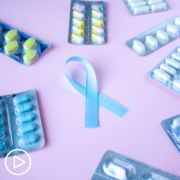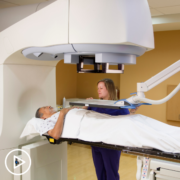What Urgent Innovations Can Advance Lung Cancer Precision Medicine?
What Urgent Innovations Can Advance Lung Cancer Precision Medicine? from Patient Empowerment Network on Vimeo.
How can non-small cell lung cancer (NSCLC) precision medicine be advanced through urgent innovations? Expert Dr. Samuel Cykert from UNC School of Medicine discusses technology and research innovations and epigenetics.
Download Resource Guide | Descargar guía de recursos
See More from [ACT]IVATED Non-Small Cell Lung Cancer
Related Resources:

|

Improving Biomarker Testing Access for Rural Lung Cancer Patients |

Empowering Lung Cancer Patients | Embracing Hope, Treatment, and Teamwork |
Transcript:
Lisa Hatfield:
In your opinion, what are the most pressing research priorities or areas of innovation needed to further advance the implementation of biomarker testing and precision medicine in the management of lung cancer?
Dr. Samuel Cykert:
Yeah, there are two areas of this, the health services researcher side of me says institutions have to implement systems that follow patients in real time to making sure that they’re getting the testing and treatment that they need from the initial suspicion of lung cancer all the way to biomarker testing and therapies, whether they include surgery, chemo, radiation, biologics or immunotherapy. Those systems need to be areas of priority so that we’re really proactive of not only following patients, but from time to time, whether there are side effects or whether there is confusion, having those systems so we know when to re-engage patients when they’re not progressing along, so on the health services side, we have a lot of just phenomenal, phenomenal new treatments, and we have to make sure that every patient who is eligible is getting those treatments. Okay?
Now, on the other side of things, we’ve talked about racial disparities and other ethnic disparities in care, and one thing that people are observing over time is that in individuals and communities where racism is experienced, where the stress of racism is felt on a frequent basis, we know that outcomes are worse. And part of that may have to do with stress hormones themselves and how stress hormones interact with cancer treatments and hypertension treatment and other treatments, but the other possibility is there is a field called epigenetics, where genes change because of stressors.
And so it’s very conceivable now, in terms of the Human Genome Project, there is hardly a difference in the genome between white and Black people. Genetic race is a social construct, and genetically we’re almost identical, but if we’re experiencing epigenetics, if we are experiencing racism and that grind in daily life, it changes things within us, and so I think it’s important to get enough tissue on the research side from Black patients and other disadvantaged groups to look at the epigenetic part of it, because there may be new genes and new biomarkers we’re not experiencing now that are more prevalent in disadvantaged peoples, and so I think research has to go in that direction too, and even let’s talk about going upstream, maybe if we can prevent the effects of racism. I wish racism would end tomorrow, right, or today, but it doesn’t look like that’s happening. And so, is there any way we can attenuate the stresses of racism so that the downstream effects are prevented?
Lisa Hatfield:
Really interesting point you make about the stress of that. That’s super important. It’s something I hadn’t thought of. So thanks for mentioning that too.
Share Your Feedback
Create your own user feedback survey









